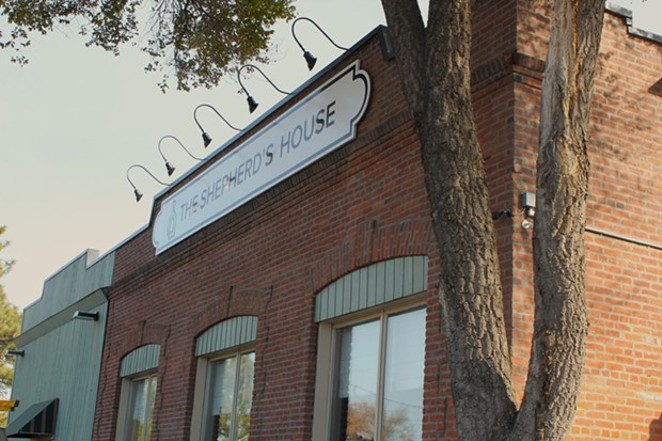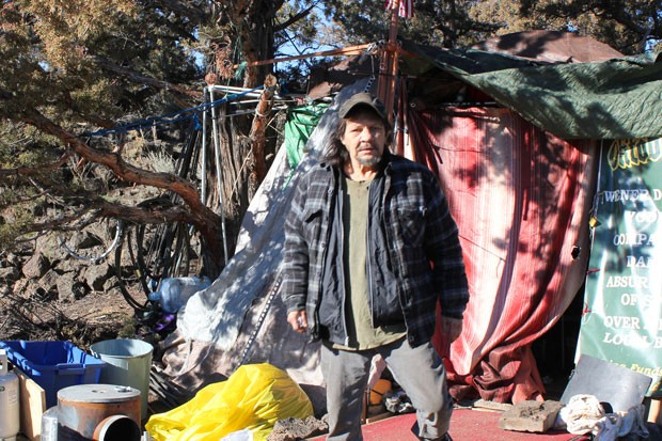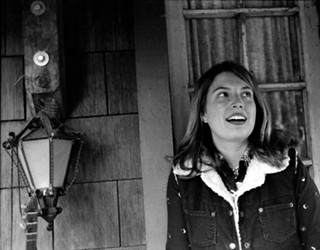They sleep in tight quarters in shelters or may interact frequently with others at outdoor tent encampments. They cannot “stay home” if they are experiencing symptoms.

A vast majority of them fit the definition of our community’s most vulnerable population.
Colleen Sinsky, who works for the Central Oregon Homeless Leadership Coalition as the coordinated entry system coordinator said she’s terrified that if the coronavirus reaches the unhoused community, many of them could end up in the hospital and wipe out all access to respirators in Central Oregon.
“We are only has healthy as our most vulnerable people,” Sinsky said.
“The people without homes are likely to get hospitalized [if they get the virus] because they don’t get great nutrition or rest, and they are cold most of the time,” said Molly Heiss the housing stabilization director for NeighborImpact.
Impact on Local Shelters
Most winter warming shelters in Central Oregon closed last week as scheduled, but the Bend Shelter on the Deschutes County Public Safety Campus will now stay open through mid-April as a result of the coronavirus crisis.
Heiss said NeighborImpact received $150,000 in emergency funding from Oregon Housing and Community Services to help keep the shelter open and provide funds to other social service organizations in the area who are scrambling to keep up with new regulations and maintain staff. Many of these nonprofits are short volunteers because their volunteers are over 60 and have been ordered to limit their exposure to others.“They often feel so invisible,” Heiss said. “We saw a big uptick in stress, when everything started to close during the day. They had found a way to exist, very habitual routines which gives them comfort and solace. Now that's gone.”
tweet this
At the Bend Shelter, it put policies in place for near-constant sanitization, while also moving some guests from the packed quarters in the bunk rooms into a common area after they serve meals, Heiss said.
Meanwhile, as other area shelters have closed in Redmond in Sisters, the shelter in Bend has seen an uptick in guests.
In order to take precautions for guests at the Bend Shelter who have chronic conditions or are over 60, Heiss moved 15 people without homes into motel rooms.
“It’s really expensive, but a good ‘shelter in place’ option for those who are high risk,” Heiss said. “We are still case managing them… getting them clothes and gift cards for groceries, checking in on them to make sure they are okay.”
The Bethlehem Inn—already operating at capacity most nights—is no longer accepting new referrals.
Gwenn Wysling, the executive director at Bethlehem Inn said they have reduced the number of guests per room from six to four and started serving meals in shifts.
No Place To Go
For many people without homes, one of the most devastating aspects of the crisis is that they no longer have places to simply “be” during the day. It's standard practice for winter warming shelters to ask guests to leave early in the morning for cleaning. From there, many go to a fast food restaurant or a coffee shop for an inexpensive meal, or to the Deschutes Public Library to get out of the elements and use the internet. But all of these locations are now closed.
“They often feel so invisible,” Heiss said. “We saw a big uptick in stress, when everything started to close during the day. They had found a way to exist, very habitual routines which gives them comfort and solace. Now that's gone.”
Heiss and other social service providers were hopeful just a few months ago that an emergency shelter bill, HB 4001, would pass through the Oregon Legislature. It would have funded a $2.4 million navigation center in Bend where the unhoused would have a place to go during the day.
“It was a victim of the session,” Heiss said.
Central Oregon Veterans Outreach
Central Oregon Veterans Outreach is seeing an influx in people coming in to access food, according to Kathy Skidmore, COVO’s executive officer.
The organization has federal funds to offer rental assistance to veterans, but expects to see a huge uptick in people needing help.
“Last week someone who came in who got laid off in the same week their landlord raised the rent,” Skidmore said. “I’m hoping individual landlords have some grace during this period.”
Skidmore explained that for many people who have been recently laid off, unemployment insurance doesn’t necessarily cover expenses.
The City of Bend has postponed the 30-day notice period for eviction for people who live at Juniper Ridge by about three weeks.
tweet this
While the rules may change with emergency legislation at the federal or state level, right now the law is that unemployment is a percentage of past earnings and runs out after 26 weeks. It requires that employees worked at least 500 hours during their last calendar quarter of employment and it does not exceed $538 a week in benefits paid, according to the Oregon Unemployment Insurance website.
While the mobile resource center brings some on Thursdays, and COVO brings a large jug on Tuesdays, the campers rely on nearby businesses to let them fill their bottles, and many of these are now closed or won’t let them in.
tweet this
Juniper Ridge
The City of Bend has postponed the 30-day notice period for eviction for people who live at Juniper Ridge by about three weeks. Campers will currently be forced to vacate May 11 instead of April 20, according to Shelly Smith, Senior Management Analyst with the City.
Last month, the City funded a mobile resource center that now goes out to the entrance of the encampment every Thursday. Stacey Witte—who runs a direct services organization for people without homes—is coordinating the effort at Juniper Ridge and is usually joined by staff from Mosaic Medical, Legal Aid Services of Oregon and the Bend Treatment Center. Since the coronavirus crisis began, Witte said some agencies are no longer allowing their employees to go out to the encampment.

Witte said that the people who live there have been having difficulty accessing water. While the mobile resource center brings some on Thursdays, and COVO brings a large jug on Tuesdays, the campers rely on nearby businesses to let them fill their bottles, and many of these are now closed or won’t let them in.
Witte also said that although she has tried to get a hand washing station semi-permanently stationed at Juniper Ridge, most of the stations in the area are being used by St. Charles Medical Center to protect their employees and patients from the spread of the virus.
Juniper Ridge may see an influx in residents. NeighborImpact began giving out “camping kits” to regulars at the Bend Shelter who were willing to sleep outside to protect themselves and reduce risks for others in the shelter. Kits include a tarp, tent, sleeping bag, propane heater and propane fuel.
Smith from City said she is working closely with nonprofits to assist them through this precautionary period with coronavirus with possible financial assistance.
“The City is in process of establishing contracts to support Family Kitchen, REACH and NeighborImpact for hotel/rental assistance for individuals experiencing homelessness who are at high medical risk or have been exposed to/or have contracted COVID-19,” Smith said in an email to the Source.
The Source is actively maintaining a resource list of vital services for the community during the coronavirus crisis. Pandemic Partners-Bend is a Facebook Group connecting those in need with people willing and able to provide volunteer services.
To keep up to date on the Source's latest reporting on the COVID-19, bookmark our Coronavirus HQ page.






















